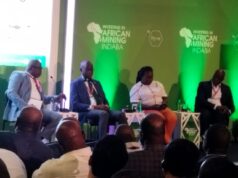In June 2019, the Extractive Industries Transparency Initiative (EITI-BF) adopted a new standard. The main innovation of this standard is the inclusion of gender in the EITI process. Four years later, what is the level of implementation of this standard by Burkina Faso? On the occasion of the celebration of International Women’s Day on 8 March, Minesactu.info spoke to Onadja Kanfido, Permanent Secretary of EITI-Burkina Faso.
Minesactu.info: Introduce us to the EITI?
Onadja Kanfido: Thank you for the opportunity to talk about the implementation of the Extractive Industries Transparency Initiative (EITI) standard in Burkina Faso. First of all, Burkina Faso is a country with great mining potential. This is why Burkina Faso joined the EITI in 2008, to ensure good governance of its natural resources. This is a global standard for promoting good governance in the extractive sector. This standard sets out requirements that lead to reforms in the administrations related to the mining sector in its member countries; the aim being to achieve or guarantee transparency in the extractive sector.
When was gender introduced into the norm?
It should be noted that the EITI Standard is dynamic and evolving in the sense that it adapts and takes into account the challenges related to better governance of the extractive sector and the broad involvement of all social strata in the management of natural wealth. To tell you that the EITI Standard has not stopped evolving since it was first adopted in 2013.
Indeed, gender has been introduced in the 2019 version of the EITI Standard.
As you know, in most resource-rich countries, women, youth, people with disabilities and other minorities are not always involved in the management and, worse, do not benefit adequately from the benefits of mining. According to the EITI, the wealth from a country’s natural resources should benefit all its citizens. Hence the need to ensure that all citizens are taken into account in the distribution of revenues from the sector. For this reason, a special focus has been placed on gender in the 2019 EITI Standard.
The 2019 EITI Standard addresses three key elements of gender: gender parity and active participation in multi-stakeholder groups; EITI disclosures through a gender lens; and inclusive outreach and communication.
The main EITI Gender Requirements are Requirement 1.4: The multi-stakeholder group and each constituency will take into account gender balance in their composition in order to move towards gender parity, Requirement 6.3: The number of people employed in the extractive industries […] should be disaggregated by sex and, where possible, by company and by occupational level, Requirement 7.1: The multi-stakeholder group is required to: […] ensure that information is understandable, including by ensuring that it is written in a clear and understandable style and available in appropriate languages; it will address the challenges that exist in terms of the needs and access to information of certain groups of citizens, including on a gender basis, and Requirement 7.4: The multi-stakeholder group is encouraged to explain what steps have been taken to ensure gender equality and inclusiveness.

Does Burkina Faso meet the requirements of the EITI?
Burkina Faso meets the requirements of the international EITI. Indeed, any country that joins the EITI is obliged to respect these requirements or face sanctions. So far, the assessments to which our country has been subjected have been successful. Since joining the EITI, Burkina Faso has undergone two assessments, all of which have resulted in the rating “Country has made significant progress in the implementation of the EITI Standard”.
A third assessment is underway and there is every reason to believe that we will pass it with flying colours, just as we have done in the past. This is proof that our country is deeply committed to the EITI Standard and the principles of transparency.
It is important to recognise that all actors involved in the implementation of the EITI in Burkina Faso are making efforts to achieve the objectives. You have the government which is undertaking the necessary reforms to guarantee transparency in the sector. You have the mining companies that submit to the various controls and commitments made in the framework of the exploitation conventions with the State and you have a civil society that carries out a citizen’s watch and does not fail to draw attention to possible dysfunctions in the sector.
The combination of all the efforts of these actors, the synergy of action that we have managed to put in place at the level of the steering committee allows us to achieve the results in accordance with the EITI Standard.
What are the gender innovations?
The major innovation on the issue of gender remains the firm will of the EITI-BF steering committee to work towards the effective involvement of women and other vulnerable groups in the management of the mining sector. Already, in the preparation of EITI reports, we require the independent administrator to provide an exhaustive list of women employed in the sector and by mining company and the type of functions they hold. This has enabled us to make a finding over the last few years. Women occupy less than 15% of jobs in the sector. We have therefore chosen to identify the causes of this fact and above all to engage in advocacy to reverse the trend. On this point, things are slowly but surely improving.
The EITI-Burkina Faso Steering Committee has also created a gender unit to address the gender issue introduced in the 2019 Standard.
It should be noted that our country is home to one of the first African associations of women in the mining sector: the Association of Women in the Mining Sector (AFEMIB), which is represented on the EITI-Burkina Faso steering committee.
In 2022, a public conference was organised for the women’s coordination of the Centre-South to share the contents of the EITI 2020 report with them. It was a major meeting for exchange and debate on the sector, in accordance with the requirements of the EITI Standard. We were able to gauge the concerns of women. And the steering committee is working to take these concerns into account.
Also in this regard, civil society organisations on the EITI-BF steering committee, with the support of the NGO Oxfam, have initiated a plea for the resources of the mining sector dedicated to financing local communities, which we call the Local Development Mining Fund (LDMF), to be used to finance income-generating activities for women and young people. The plea is that 30% of the LDMF should be allocated to the activities of these important sectors of our population. Naturally, at the EITI-BF level, we find this approach salutary and we support it.
What are the prospects for taking gender into account?
As mentioned above, the EITI Burkina Faso Steering Committee has made the effective involvement of women and youth in the management of the extractive sector its main focus. Indeed, many actions are in view to ensure a progressive involvement of women and youth. The integration of more women into the steering committee is being considered so that they can play a leading role in decision-making with regard to the governance of natural resources and integrate their views and experiences. Awareness-raising and communication activities are also planned with the aim of social inclusion.
In order to meet the challenges of their full involvement, we plan to develop a national strategy for the implementation of the EITI in Burkina Faso, which will include a gender component and resources for the implementation of all activities aimed at increasing the inclusion of women in this strategic sector and, above all, ensuring that they benefit from the distribution of wealth.
A final word
I would like to thank you for your interest in this sector and particularly in the EITI-BF.
I wish the women of Burkina Faso a happy commemoration and invite them to visit the EITI-BF website www.itie-bf.bf/ for more information on the sector.
Interview by Elie KABORE
#Mines_Actu_Burkina
#8mars2023










